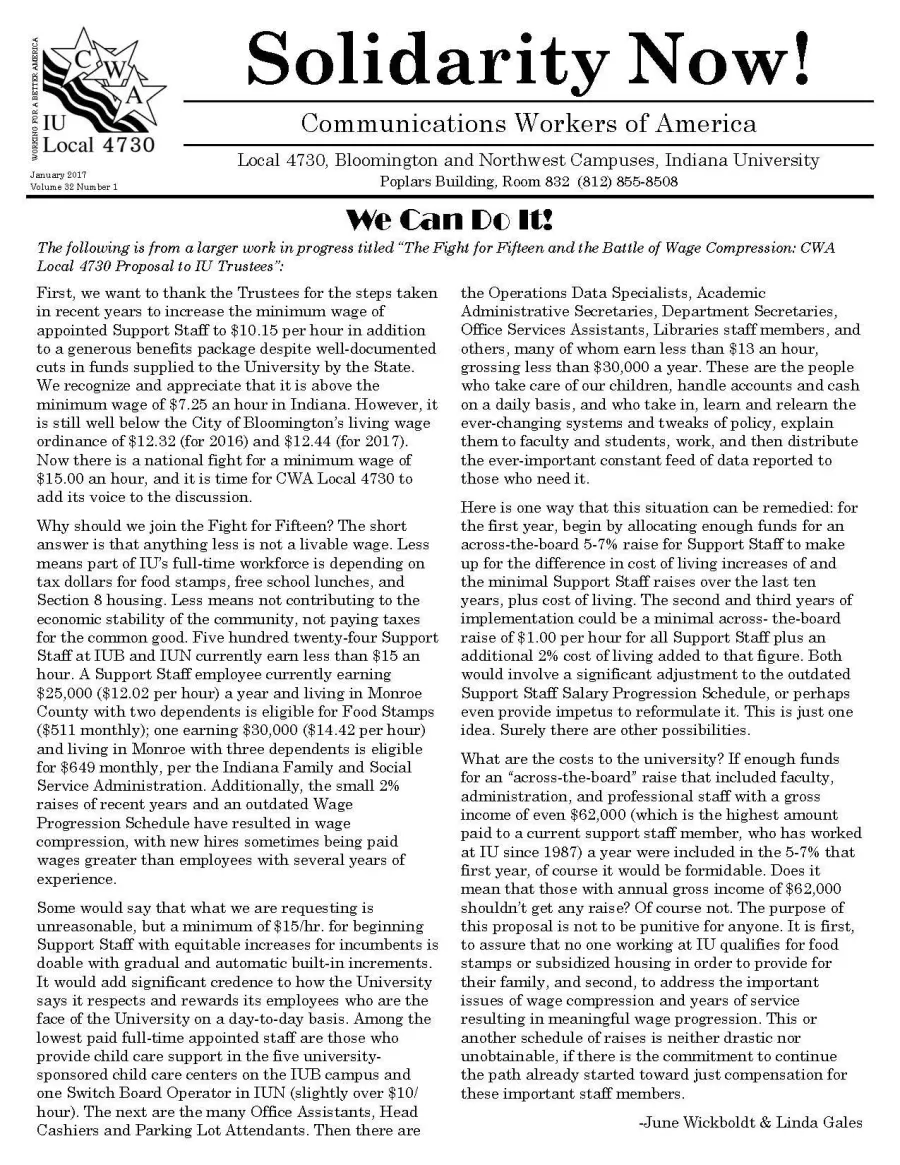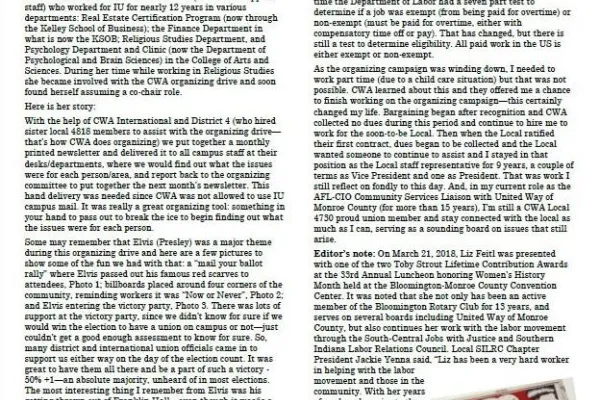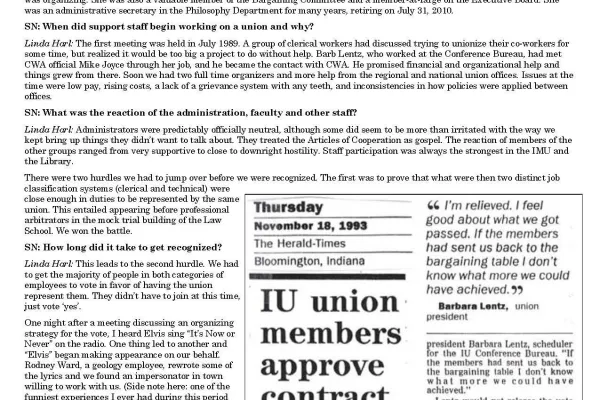January 2017 Solidarity Now!

We Can Do It!
The following is from a larger work in progress titled “The Fight for Fifteen and the Battle of Wage Compression: CWA Local 4730 Proposal to IU Trustees”:
First, we want to thank the Trustees for the steps taken in recent years to increase the minimum wage of appointed Support Staff to $10.15 per hour in addition to a generous benefits package despite well-documented cuts in funds supplied to the University by the State. We recognize and appreciate that it is above the minimum wage of $7.25 an hour in Indiana. However, it is still well below the City of Bloomington’s living wage ordinance of $12.32 (for 2016) and $12.44 (for 2017). Now there is a national fight for a minimum wage of $15.00 an hour, and it is time for CWA Local 4730 to add its voice to the discussion.
Why should we join the Fight for Fifteen? The short answer is that anything less is not a livable wage. Less means part of IU’s full-time workforce is depending on tax dollars for food stamps, free school lunches, and Section 8 housing. Less means not contributing to the economic stability of the community, not paying taxes for the common good. Five hundred twenty-four Support Staff at IUB and IUN currently earn less than $15 an hour. A Support Staff employee currently earning $25,000 ($12.02 per hour) a year and living in Monroe County with two dependents is eligible for Food Stamps ($511 monthly); one earning $30,000 ($14.42 per hour) and living in Monroe with three dependents is eligible for $649 monthly, per the Indiana Family and Social Service Administration. Additionally, the small 2% raises of recent years and an outdated Wage Progression Schedule have resulted in wage compression, with new hires sometimes being paid wages greater than employees with several years of experience.
Some would say that what we are requesting is unreasonable, but a minimum of $15/hr. for beginning Support Staff with equitable increases for incumbents is doable with gradual and automatic built-in increments. It would add significant credence to how the University says it respects and rewards its employees who are the face of the University on a day-to-day basis. Among the lowest paid full-time appointed staff are those who provide child care support in the five universitysponsored child care centers on the IUB campus and one Switch Board Operator in IUN (slightly over $10/hour). The next are the many Office Assistants, Head Cashiers and Parking Lot Attendants. Then there are the Operations Data Specialists, Academic Administrative Secretaries, Department Secretaries, Office Services Assistants, Libraries staff members, and others, many of whom earn less than $13 an hour, grossing less than $30,000 a year. These are the people who take care of our children, handle accounts and cash on a daily basis, and who take in, learn and relearn the ever-changing systems and tweaks of policy, explain them to faculty and students, work, and then distribute the ever-important constant feed of data reported to those who need it.
Here is one way that this situation can be remedied: for the first year, begin by allocating enough funds for an across-the-board 5-7% raise for Support Staff to make up for the difference in cost of living increases of and the minimal Support Staff raises over the last ten years, plus cost of living. The second and third years of implementation could be a minimal across- the-board raise of $1.00 per hour for all Support Staff plus an additional 2% cost of living added to that figure. Both would involve a significant adjustment to the outdated Support Staff Salary Progression Schedule, or perhaps even provide impetus to reformulate it. This is just one idea. Surely there are other possibilities.
What are the costs to the university? If enough funds for an “across-the-board” raise that included faculty, administration, and professional staff with a gross income of even $62,000 (which is the highest amount paid to a current support staff member, who has worked at IU since 1987) a year were included in the 5-7% that first year, of course it would be formidable. Does it mean that those with annual gross income of $62,000 shouldn’t get any raise? Of course not. The purpose of this proposal is not to be punitive for anyone. It is first, to assure that no one working at IU qualifies for food stamps or subsidized housing in order to provide for their family, and second, to address the important issues of wage compression and years of service resulting in meaningful wage progression. This or another schedule of raises is neither drastic nor unobtainable, if there is the commitment to continue the path already started toward just compensation for these important staff members.
-June Wickboldt & Linda Gales
[Read more by downloading the PDF version of Solidarity Now!]


